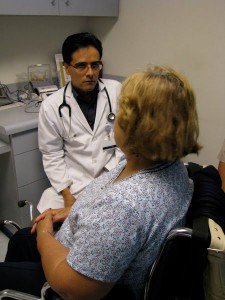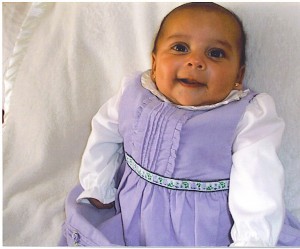LaSalle News
LaSalle Clinics Helping Seniors Get Healthcare Coverage
 (SAN BERNARDINO, Calif.) Seniors and other Medicare recipients who lost specialized benefits such as vision and dental last year can get that coverage back through some Medicare Advantage plans.
(SAN BERNARDINO, Calif.) Seniors and other Medicare recipients who lost specialized benefits such as vision and dental last year can get that coverage back through some Medicare Advantage plans.
“Many of our patients are dually enrolled in both Medicare and Medi-Cal. Last July Medi-Cal dropped senior coverage for vision, dental, podiatry, psychological services and many other forms of health care” explains Susan De Frates a 13-year veteran with LaSalle Medical Associates, now as a patient relation specialist.
“There are plans that can give some of these benefits back,” she said.
LaSalle began this program in December of 2009 for both seniors and disabled patients, who are the two categories of people eligible for Medicare. Enrollment is growing rapidly.
“Dr. Albert Arteaga,” De Frates says of LaSalle’s founder and President, “has spearheaded our move into greater assistance for the disabled and elderly. He’s always thinking of the patients above all else.”
“We want to treat all our patients, regardless of age or condition, with courtesy and respect, and provide all the needed medical help if possible,” Dr. Albert Arteaga said.
LaSalle Medical Associates offers this program to all eligible seniors and disabled.
“We are an information center,” said De Frates. “If we don’t offer the services they need, we can find a clinic for them. We can even call and make the appointment for them.”
De Frates, patient relation specialist, serves LaSalle senior citizens at its Mt. Vernon clinic.
“People are very happy with the service LaSalle provides,” he said.
About LaSalle Medical Associates
LaSalle Medical Associates, Inc., operates four clinics employing more than 120 dedicated healthcare professionals, treating children, adults, and seniors in San Bernardino County. LaSalle’s patients are primarily served by Medi-Cal and they also accept Blue Cross, Blue Shield, Molina, Care 1st, Health Net and Inland Empire Health Plan (IEHP). LaSalle’s clinics are at 17577 Arrow Blvd. in Fontana, 16455 Main St. in Hesperia and 1505 West 17th St. and 565 N. Mt. Vernon Ave. in San Bernardino.
LaSalle Medical Associates, Inc., is also an Independent Practice Association (IPA) of independently contracted doctors, hospitals and clinics, delivering high quality care to more than 245,000 patients in Fresno, Kings, Los Angeles, Madera, Riverside, San Bernardino, San Joaquin and Tulare Counties.
LaSalle’s IPA members in the Inland Empire include: LaSalle Medical Associates, Arrowhead Orthopedics, Arther Medical Group, Rancho Medical Group, Rancho Paseo Medical Group, Alessandro Medical Group Banning Medical Group, and San Bernardino Urological Associates. Hospital affiliations include: Rancho Springs Medical Center, Arrowhead Regional Medical Center, Community Hospital of San Bernardino, St. Bernadine Medical Center, Mountains Community Hospital, Redland Community Hospital, Loma Linda University Medical Center, Corona Regional Medical Center, Riverside County Medical Center, Parkview Community Hospital.
-end-
Many Students Need Physicals

To make sure your kindergartener is happy, healthy and does well in school make an appointment today for the required kindergarten physical. Students who play sports, and in some cases, students attending college, also need physicals. (Photo by Carl Dameron)
(SAN BERNARDINO, Calif.) – For many students, seeing the doctor for a physical evaluation is necessary at the start of a new school year.
“Physicals are required when a child enters school in California, most commonly kindergarten,” said Dr. Albert Arteaga, CEO of LaSalle Medical Associates, Inc. “And if an older child is into sports, almost all schools will require them to obtain a physical at the beginning of the season. Also, college students often need back-to-school physicals as a condition of living on campus.”
Physicals for children typically include making sure they have reached adequate height and weight for their age. Doctors also make sure children are up-to-date on the immunizations needed for their age.
Young children also are evaluated to make sure they can perform certain tasks. For instance, a child entering kindergarten should be able to play well with other children, state his or her first and last name, color with crayons and dress himself or herself.
Kindergarteners who are not able to do these things may have developmental delays that will cause them to need extra help throughout their education, and may also have medical conditions that need close monitoring by a doctor.
As with adults, physicals also are a time to check overall health, by checking blood pressure, hearing and vision. Doctors also order blood tests to check for anemia, and a urinalysis to check for infections and diseases such as diabetes.
“All of these things we check for in a physical are what’s known as preventative health care,” Dr. Arteaga said. “We want to make sure we catch things as early as we can so that we can start interventions before they cause serious health problems.”
Most K-12 students in San Bernardino County begin school in August, as do many colleges. Parents of any students needing a mandatory back-to-school physical to start school before Labor Day should schedule an appointment with their doctor immediately. Athletes, and anyone who starts school in September should not wait much longer.
“It is important not to wait until the last minute,” Dr. Arteaga said. “Summer is our busy season, and some doctors won’t be able to see you right away. “
About LaSalle Medical Associates
LaSalle Medical Associates, Inc., operates four clinics employing more than 120 dedicated healthcare professionals, treating children, adults, and seniors in San Bernardino County. LaSalle’s patients are primarily served by Medi-Cal and they also accept Blue Cross, Blue Shield, Molina, Care 1st, Health Net and Inland Empire Health Plan (IEHP). LaSalle’s clinics are at 17577 Arrow Blvd. in Fontana, 16455 Main St. in Hesperia and 1505 West 17th St. and 565 N. Mt. Vernon Ave. in San Bernardino.
LaSalle Medical Associates, Inc., is also an Independent Practice Association (IPA) of independently contracted doctors, hospitals and clinics, delivering high quality care to more than 245,000 patients in Fresno, Kings, Los Angeles, Madera, Riverside, San Bernardino, San Joaquin and Tulare Counties.
LaSalle’s IPA members in the Inland Empire include: LaSalle Medical Associates, Arrowhead Orthopedics, Arther Medical Group, Rancho Medical Group, Rancho Paseo Medical Group, Alessandro Medical Group Banning Medical Group, and San Bernardino Urological Associates. Hospital affiliations include: Rancho Springs Medical Center, Arrowhead Regional Medical Center, Community Hospital of San Bernardino, St. Bernadine Medical Center, Mountains Community Hospital, Redland Community Hospital, Loma Linda University Medical Center, Corona Regional Medical Center, Riverside County Medical Center, Parkview Community Hospital.
-end-
Stop Whooping Cough With Immunizations

Keep your baby happy and healthy like Alondra by making sure she has the proper vaccinations. DTaP, which prevents whooping cough, is an especially important vaccination as California is experiencing an epidemic of the disease and already one baby has died from it in San Bernardino County. Photo by Carl Dameron
(SAN BERNARDINO, Calif.) – “Pertussis is now an epidemic in California’,” states the San Bernardino County Public Health Department website.
Statewide, there have been 910 cases of pertussis, which causes “whooping cough,” reported from January through June 15, the county health department reports. This compares to only 219 cases in the first six months of 2009.
Five infants – all under three months of age – have died from the disease since January. One death was in San Bernardino County this spring.
“But, there is a way to prevent this disease from spreading,” said Dr. Albert Arteaga, president of LaSalle Medical Associates. “That is by making sure all children are immunized against this sometimes deadly disease.”
Babies should receive immunization against pertussis at 2 months, 4 months, and 6 months of age, according to the Center for Disease Control. Young children should receive booster shots between 15-18 months, and again at ages 4-5 years.
Pertussis, which is administered with vaccines for diphtheria and tetanus, is one of the required immunizations children must have before they begin school. The vaccine given to children age 6 and younger is known as DTaP.
“With many schools in the Inland Empire returning to a new year in August, parents should schedule back-to-school immunizations immediately,” Dr. Arteaga said. “If they wait until only a few days before school starts to make the appointment, we may not be able to see them before their new school year begins.”
“Pertussis is a very serious threat this year,” Dr. Arteaga added. “Children can avoid it and many other diseases simply by staying current on immunizations.”
Four booster immunizations – including DTaP – are needed for all kindergarteners before entering school for the first time, said Dr. Cheryl Emoto, director of medical services. And, as they grow older, children need additional immunizations.
“Children entering kindergarten should receive boosters for DTaP (diphtheria, tetanus and pertussis), polio, MMR (measles, mumps and rubella) and Varicella (chicken pox),” Dr. Emoto said. “Fortunately, there is a combination vaccine that is available that allows for only three injections instead of four.”
If parents have kept up with their child’s immunizations from birth, only the above booster immunizations are needed. However, if the child is behind on their other required immunizations, they may need several doses of immunizations to get “caught up.”
New this year, says Dr. Emoto, is an updated pneumococcal vaccine (Prevnar 13). This vaccine includes added protection as compared to the older version (Prevnar 7) and all children between 15 months and 5 years of age should have one additional dose of the newer Prevnar, “even if your doctor previously told you that your child was up-to-date.”
When children turn 11, they should receive the meningitis vaccine for the first time, and a Tdap booster, Dr. Emoto said Tdap covers the same diseases (Tetanus, diphtheria and pertussis). The Tdap vaccine is particularly important this year because of the pertussis epidemic.
Parents should schedule these vaccines shortly after the child’s 11th birthday, but they also can be part of a back-to-school immunization routine for any student, even those over 18.
“Children older than 11 who have not received these vaccines should also come in to get them,” she said. “And if you have a teenager who is enrolling in college, planning to live in a dormitory, and hasn’t been vaccinated for meningitis and Tdap, they should be vaccinated now.”
About LaSalle Medical Associates
LaSalle Medical Associates, Inc., operates four clinics employing more than 120 dedicated healthcare professionals, treating children, adults, and seniors in San Bernardino County. LaSalle’s patients are primarily served by Medi-Cal and they also accept Blue Cross, Blue Shield, Molina, Care 1st, Health Net and Inland Empire Health Plan (IEHP). LaSalle’s clinics are at 17577 Arrow Blvd. in Fontana, 16455 Main St. in Hesperia and 1505 West 17th St. and 565 N. Mt. Vernon Ave. in San Bernardino.
LaSalle Medical Associates, Inc., is also an Independent Practice Association (IPA) of independently contracted doctors, hospitals and clinics, delivering high quality care to more than 245,000 patients in Fresno, Kings, Los Angeles, Madera, Riverside, San Bernardino, San Joaquin and Tulare Counties.
LaSalle’s IPA members in the Inland Empire include: LaSalle Medical Associates, Arrowhead Orthopedics, Arther Medical Group, Rancho Medical Group, Rancho Paseo Medical Group, Alessandro Medical Group Banning Medical Group, and San Bernardino Urological Associates. Hospital affiliations include: Rancho Springs Medical Center, Arrowhead Regional Medical Center, Community Hospital of San Bernardino, St. Bernadine Medical Center, Mountains Community Hospital, Redland Community Hospital, Loma Linda University Medical Center, Corona Regional Medical Center, Riverside County Medical Center, Parkview Community Hospital.
-end-
Adults Need Immunizations Too
(SAN BERNARDINO, Calif.) “You’re never too old for immunizations. It is not just children who need immunizations,” said Dr. Albert Arteaga, president and CEO of LaSalle Medical Associates. “Especially as we get older, or when we travel to foreign countries, immunizations are a safe way to guard against diseases that could cause unnecessary pain and suffering.”
For the very youngest adults, those in the 18-26 age category, two immunizations are especially recommended, although both can be given in the preteen and earlier teen years.
The first of these is the meningitis vaccine, as this disease is especially contagious among people who live in close proximity, such as a college dormitory.
“If you are enrolling in college, and are planning to live in a dormitory, and you haven’t been vaccinated for meningitis, you should be vaccinated now,” said Dr. Cheryl Emoto, director of medical services for LaSalle Medical Associates.
Young adults up to age 26 should also receive a vaccine against the human papiolloma (HPV) virus, which is a sexually transmitted disease that infects the genitals, and can cause cancer in either sex, but is especially likely to cause cervical cancer in women. 2010 is the first year it has been available to males.
“The HPV virus is the main cause of cervical cancer in women,” Emoto explained. “It is important that a girl or young woman receive three doses, which are given over a six-month period, before her first sexual encounter in order for the vaccine to be fully effective. Young men can also benefit from this vaccination, especially if they receive it before becoming sexually active.”
Young and older adults may also need a tetanus booster, as it should be given every 10 years.
There are also vaccinations especially recommended for both middle-aged adults and senior adults.
Middle-aged adults, especially those who were less than five years old at any time between 1963 and 1968, should consider a measles/mumps/rubella (MMR) vaccination. This is because a vaccine used during those years relied on a “killed” virus instead of a live virus, which was not as effective as the live virus vaccine used since 1969.
Measles/mumps/rubella vaccines are especially crucial for women of childbearing age, and anyone who attends college or trade school, works in health care or will soon travel internationally or on a cruise ship.
Adults born prior to 1957 usually do not need measles or mumps vaccines, as most of them contracted both mumps and measles before the first vaccine was developed in 1963. However, any in this age category who either work in health care, or who are pre-menopausal women, should consider the MMR vaccine if they have not yet received it.
But there are vaccines needed for older adults. The pneummococal (pneumonia) vaccine is recommended for all over age 65 and Zoster (shingles) vaccine is recommended for all over the age of 60. Adults over these ages are at greater risk of developing serious health problems if they contract these diseases.
People of any age who are traveling outside the United States may need vaccinations against diseases that are much more prevalent in other countries, such as hepatitis and meningitis.
About LaSalle Medical Associates
LaSalle Medical Associates, Inc., operates four clinics employing more than 120 dedicated healthcare professionals, treating children, adults, and seniors in San Bernardino County. LaSalle’s patients are primarily served by Medi-Cal and they also accept Blue Cross, Blue Shield, Molina, Care 1st, Health Net and Inland Empire Health Plan (IEHP). LaSalle’s clinics are at 17577 Arrow Blvd. in Fontana, 16455 Main St. in Hesperia and 1505 West 17th St. and 565 N. Mt. Vernon Ave. in San Bernardino.
LaSalle Medical Associates, Inc., is also an Independent Practice Association (IPA) of independently contracted doctors, hospitals and clinics, delivering high quality care to more than 245,000 patients in Fresno, Kings, Los Angeles, Madera, Riverside, San Bernardino, San Joaquin and Tulare Counties.
LaSalle’s IPA members in the Inland Empire include: LaSalle Medical Associates, Arrowhead Orthopedics, Arther Medical Group, Rancho Medical Group, Rancho Paseo Medical Group, Alessandro Medical Group Banning Medical Group, and San Bernardino Urological Associates. Hospital affiliations include: Rancho Springs Medical Center, Arrowhead Regional Medical Center, Community Hospital of San Bernardino, St. Bernadine Medical Center, Mountains Community Hospital, Redland Community Hospital, Loma Linda University Medical Center, Corona Regional Medical Center, Riverside County Medical Center, Parkview Community Hospital.
-end-

